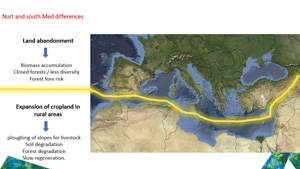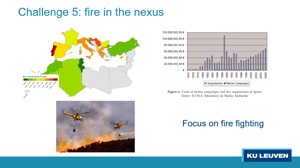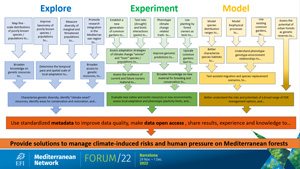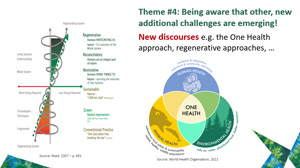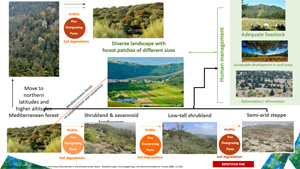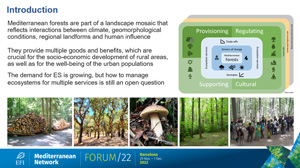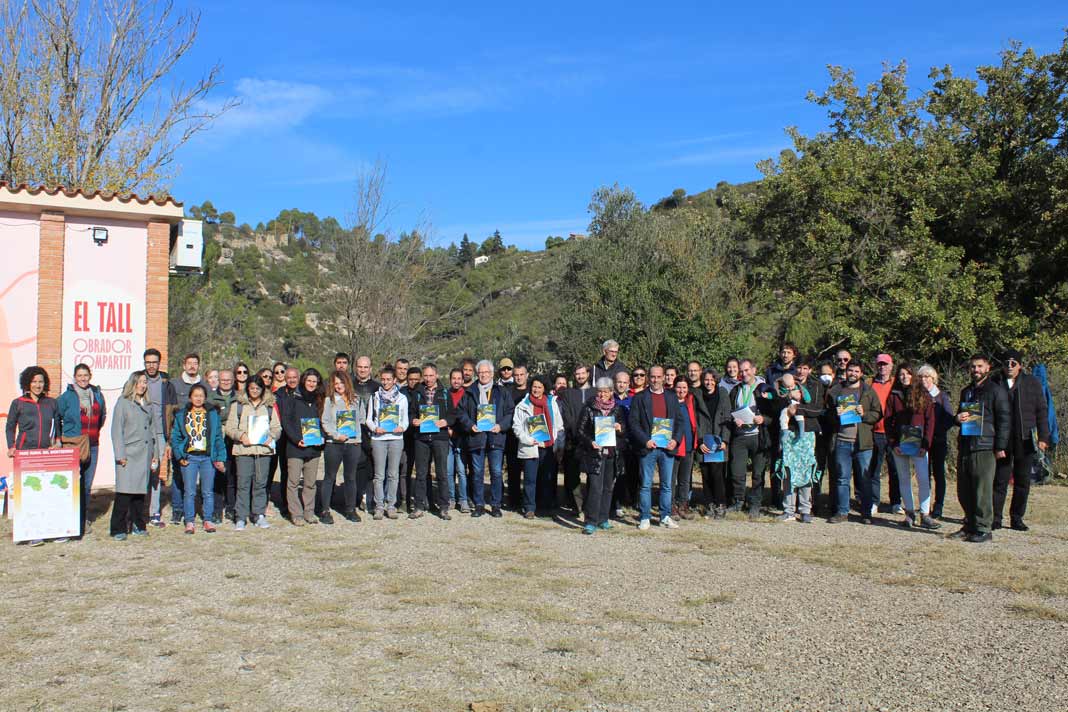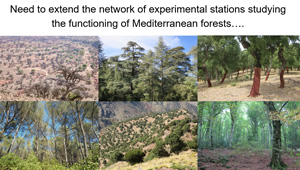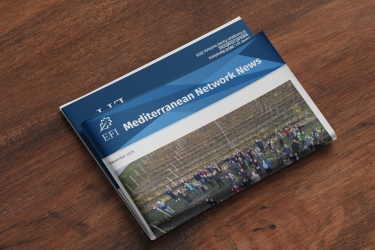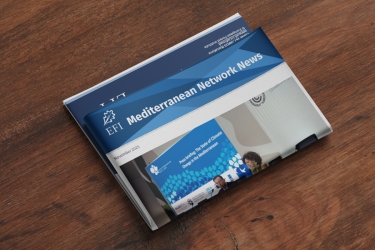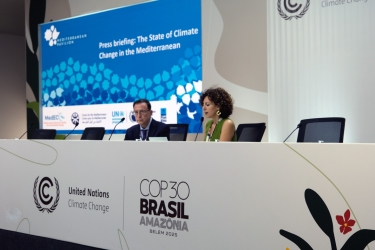Renewed collaboration for Mediterranean forest resilience in first successful Forum
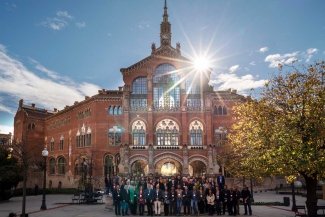
A sense of commitment and a willingness to work together to seek solutions was at the heart of a major new networking event for the Mediterranean forest calendar.
Wide-ranging collaboration on key themes and cross-cutting issues for Mediterranean forest management for resilience were the focus of discussions as forest researchers, policy makers and practitioners from around the Mediterranean gathered in Barcelona for a successful celebration of the first edition of EFI’s Mediterranean Network Forum.
The Forum saw the launch of the Mediterranean Forest Research Agenda 2030, a publication coordinated by EFIMED with dedicated collaboration from experts from around the region, in an update to the first Mediterranean Research Agenda (2010-2020). The Agenda describes where research is needed across four major themes and recommendations to make Mediterranean forests more resilient in the face of climate change and demographic challenges.
Day one
The Forum’s high-level opening session saw representatives from key international bodies committing to a renewed collaboration for Mediterranean forests. Octavi Quintana (PRIMA Foundation), Alessandra Sensi (Union for the Mediterranean) and Ümit Turhan (FAO Silva Mediterranea) joined Michele Bozzano (EFIMED) in the majestic setting of Barcelona’s Sant Pau Art Nouveau Site, with Elsa Enríquez Alcalde (Ministry for the Ecological Transition and Demographic Challenge of Spain) and Ana María Aricha Yanguas (Ministry of Science and Innovation of Spain) joining online.
|
Magda Bou Dagher Kharrat (EFIMED) set the scene for discussion with an opening presentation on the historical, geographical & demographic background of the Mediterranean, underlining how the landscape’s ecological heterogeneity shaped by humans is challenged today on both rims of the Mediterranean. |
|||
|
A second keynote was given by Bart Muys (KU Leuven), who presented these interconnected challenges, of climate change, land use and land use change, biodiversity levels and the water issue, before connecting them all via the fire nexus, and reflecting on how a circular bioeconomy for well-being could offer opportunities for win-wins in the Mediterranean landscape. |
Michele Bozzano introduced the four main themes of the Mediterranean Forest Research Agenda 2030: forest resilience; ecosystem services; forest genetic resources; and bioeconomy. Prior to the Forum, a series of webinars had explored the findings of four commissioned papers on these themes. The authors of the papers, who had led the webinar discussions, presented their outputs, focusing on the challenges to implementation of the recommendations for action, which were then discussed with Forum participants.
|
Bruno Fady (National Institute of Agronomic Research, INRAE) gave an overview of the bibliometric analysis paper and webinar outputs on conservation and management of biodiversity and forest genetic resources. “There is a growing awareness worldwide of the importance of genetic diversity for resilience and adaptation of forest trees, forests and other habitats in a context of risk management. |
|||
|
Laura Secco (University of Padova) shared insights on social & business innovations and policy instruments to implement the Mediterranean forest-based bioeconomy. “Technological innovations must be integrated with social ones to implement the Mediterranean forest-based bioeconomy.” |
|||
|
Joan Pino (Catalan Centre for Ecological Research and Forestry Applications, CREAF) presented a paper on the theme of forest resilience in a context of global change related forest disturbances. “Aridity, species invasion, soil fragility, and abandonment of rural areas are among the several concurrent risks for forests in the Mediterranean”. |
|||
|
Davide Travaglini (University of Florence) shared a paper looking at research progress and knowledge gaps on managing Mediterranean forests for multiple ecosystem services. “Research must pay more attention to Southern and Eastern Mediterranean countries, where multiple pathways of land abandonment are emerging”. |
The various topics of the morning session were brought together in the afternoon in collaborative workshops on cross-cutting issues across the four themes. Participants considered the actions and knowledge needed to improve Mediterranean forest management for resilience in the various beautiful spaces of the Sant Pau Art Nouveau site, where EFIMED is fortunate to have its offices through a hosting agreement with Barcelona’s Generalitat de Catalonia.
The day finished with a well-attended poster session on the themes of the MFRA 2030.
Day two
The second day of the Forum took participants out of the conference rooms and into the forest. The technical visit to Montserrat Rural Park, organized in collaboration with the provincial council of Barcelona (DIBA) focused on multi-actor collaboration for forest management for wildfire prevention and rural livelihoods.
The visit explored circular wood-based bioeconomy initiatives and cow grazing in a dehesa for wildfire prevention, a cooperative butchery provided by DIBA where shepherds and herders can process their own meat without thirds parties to sell under the "parc rural del Montserrat" label, and multi-actor collaboration between shepherds, forest landowners and cheese makers showing the importance of silvo-pastoralism for forest management and a fruitful way to boost the rural economy.
Day three
|
The third and final day opened with a keynote presentation by Thierry Gauquelin (Aix Marseille University) on the potential for a network of experimental facilities to assess the impact of climate change and management practices in Mediterranean forests. “We must extend the network of experimental stations with a common protocol and minimum equipment to study the functioning of forests in the Mediterranean.” |
Participants then completed their work in groups to define and refine the gaps in scientific knowledge and necessary actions for the future of Mediterranean forests, which were then shared in a final plenary session. Highlights included a call for more support for associations of small-scale forest owners, a roadmap to forest resilience, soil conservation, and an open-access database across forests in the Mediterranean.
There were indeed a considerable number of actions and knowledge gaps identified to complement and extend what is already set out in the MFRA2030. EFIMED’s task now is to articulate the fruits of the Forum into priorities with which to approach policymakers, funding agencies and relevant organisations to see how we can transform this collective knowledge and analysis into action for Mediterranean forests.
The aim of MFRA 2030 is to spur researchers and practitioners into further action and to provide a reference of support for collective efforts to strengthen Mediterranean forests’ resilience in the face of climate and biodiversity crises, new social demands, and demographic challenges. The Forum outputs will be available soon and we hope that for the next edition of the Forum, projected for 2025, we will already be able to share some outcomes from this fantastic first collaboration.
